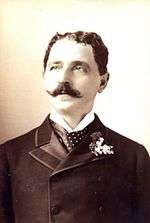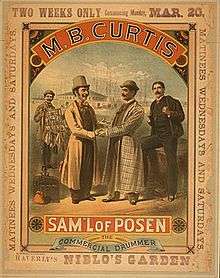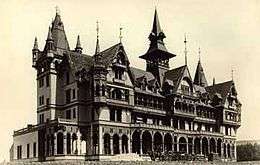Maurice Curtis
| Maurice Curtis | |
|---|---|
 | |
| Born |
Mauritz Bertram Strelinger 1849 Bohemia |
| Died | c. 1920 (aged 70–71) |
| Criminal charge | Murder |
| Criminal status | Acquitted |
Maurice Curtis (1849 – 1920), stage name M. B. Curtis, was an American stage actor, producer, and real estate developer, at one point tried and acquitted of a policeman's murder.
Biography

He was born in Bohemia as Mauritz Bertram Strellinger, before moving to the United States and working as a porter in a New York City store,[1] but took the stage name Maurice Curtis, or M. B. Curtis. He was best known for starring as Samuel Plastrick, the lead character in the comic melodrama Sam'l of Posen; or, The Commercial Drummer by George H. Jessop. It was first produced in New York on May 16, 1881 and is credited as introducing the first salesman as hero character. In 1883, Curtis purchased the copyright of the play from Jessop and continued using the Plastrick character into the 1890s.[2] The character was a Jewish "drummer", or traveling salesman, and Curtis claimed he based his portrayal of him on a real salesman in San Francisco, claiming, "He was, perhaps, one of the most comical men that I ever met; and for the life of me I could never refrain from giving imitations of him."[3] The role earned him substantial fame and wealth amounting to US$250,000 ($6,663,889 today).[1] He was the only private citizen to ever pay to keep the Statue of Liberty lit.[4]


Curtis used some of his income to invest in developing real estate in Berkeley, California. He began building the Peralta Park Hotel in 1888; the structure, with its sixty rooms and twenty baths, opened in 1891.[5] The building was later converted into a Catholic school until its demolition in 1959.[6] A year after the building opened, Curtis was arrested for drunken behavior. The arresting officer, Alexander Grant, was shot and killed and, though Curtis denied responsibility, he was indicted for murder.[5] Witnesses claimed he was found at the scene with an abrasion on the wrist indicating he had been struggling with someone, and he was heard saying, "My God! I'd give the world to get back to the last four hours!"[7] Nevertheless, he was found not guilty in 1893 after four trials, two hung juries, and a procedural dismissal, but both his finances and reputation were ruined.[8]
Curtis revived his Plastrick show. He tempered the stereotypical or crude aspects of the character and, by 1894, one reviewer noted, "Nobody, whether Jew or Gentile, could find offence in this amiable, ingenious and kind hearted young Israelite."[9] With this change, the character was less successful overseas, however. Curtis attempted one performance in London on July 4, 1895, and one historian noted the "puzzling afternoon" was "beyond the grasp" of the audience, who expected to laugh at the Jewish character rather than with him.[10]
In 1899, Curtis founded the M. B. Curtis Afro-American Minstrel Company (sometimes called the Afro-American All Star Carnival), which began a world tour specifically to compete with a similar troupe overseen by Orpheus McAdoo.[11] Once in Australia, Curtis abandoned the group and Ernest Hogan stepped up as manager in his place.[12]
References
- 1 2 Duke, Thomas S. Celebrated Criminal Cases of America. San Francisco: The James H. Barry Company, 1910: 31.
- ↑ Spears, Timothy B. 100 Years on the Road: The Traveling Salesman in American Culture. Yale University Press, 1995: 136. ISBN 0-300-07066-7
- ↑ Harap, Louise. The Image of the Jew in American Literature: From Early Republic to Mass Immigration. Syracuse, NY: Syracuse University Press, 2003 (second edition): 231. ISBN 0-8156-2991-5
- ↑ "Richard Schwartz tells terrific tale of world famous actor who transformed Berkeley — Berkeleyside". berkeleyside.com. Retrieved 2017-04-07.
- 1 2 Wollenberg, Charles. Berkeley: A City in History. Berkeley: University of California Press, 2008: 42. ISBN 978-0-520-25307-0
- ↑ Markel, Wendy P. Berkeley. Charleston, SC: Arcadia Publishing, 2009: 94. ISBN 978-0-7385-6942-0
- ↑ Duke, Thomas S. Celebrated Criminal Cases of America. San Francisco: The James H. Barry Company, 1910: 32.
- ↑ Berresford Mark. That's Got 'Em!: The Life and Music of Wilbur C. Sweatman. University Press of Mississippi, 2010: 21–22. ISBN 978-1-60473-099-9
- ↑ Harap, Louise. The Image of the Jew in American Literature: From Early Republic to Mass Immigration. Syracuse, NY: Syracuse University Press, 2003 (second edition): 233. ISBN 0-8156-2991-5
- ↑ Schiff, Ellen. From Stereotype to Metaphor: The Jew in Contemporary Drama. Albany, NY: State University of New York Press, 1982: 29. ISBN 0-87395-621-4
- ↑ Berresford Mark. That's Got 'Em!: The Life and Music of Wilbur C. Sweatman. University Press of Mississippi, 2010: 22. ISBN 978-1-60473-099-9
- ↑ Lynn Abbott and Doug Seroff. Ragged But Right: Black Traveling Shows, Coon Songs, and the Dark Pathway to Blues and Jazz. University Press of Mississippi, 2009: 44. ISBN 1604731486
External links
- Maurice Curtis lent Berkeley brief splendor, by Daniella Thompson (June 2006)